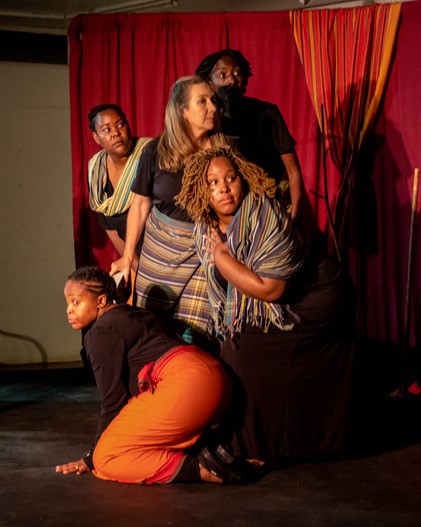Reviewed by Margaretta wa Gacheru (posted February13, 2022)
Cast of Spread your Garment over me'
‘Spread your Garment Over Me’ is both a glorious teaching device and an elegantly-crafted production staged last weekend at Kenya Cultural Centre’s Cheche Gallery.
Chemi Chemi
Players made their acting debut last Friday night, featuring a bevy of
beautiful storytelling Kenyan women, all of whom have theatrical credentials
that say much about the advanced stage of our entertainment industry.
Julisa Rowe,
who produced and directed ‘Garment’, has played a significant role in that
progression, having taught most of the cast during her days teaching Theatre at
Daystar University. An actor in her own
right, Rowe founded Chemi Chemi Players to nurture and build a Christ-centric
community of professional performers. But one didn’t necessarily have to be a
Christian to enjoy the ‘Garment’, given the quality of storytelling which was
neither didactic nor preachy. It was however rich with passion and energy as
all the actors had amazing stories to share about women who played heroic roles
in Biblical history, women like Deborah (played with authority and militant
power by Wambui Kyama) and Mary Magdelene (Julisa Rowe).
Yet beyond the actors being charismatic storytellers, it was the script by Gillette Elvgren that intrigued me. That’s because I have often asked myself where are the women in the Bible? Is their absence from much of the Scriptures purely because the texts were all written by men who overlooked the role of women? Everyone knows about Eve (played by Sakina Mirichii) and Mary, Mother of Jesus. Many have heard about the Witch of Endor, (played with wily agility by Nyokabi Macharia) and possibly even the prophetess Anne (Wambui Kyama) whose single-minded intention to meet the Messiah ultimately paid off.
But it was Elvgren’s script that gave me an
answer to my query and also a deeper appreciation for the many more women who
played significant parts in advancing the broader Scriptural story. But I
confess, the show made me scurry home to examine my Bible to find out if the
play was actually meant to exclusively portray women mentioned in the Good
Book, or did the playwright simply exercise a bit of poetic license.
What was
wonderful about this play is that one didn’t need to be a Bible scholar to
discover these real women. Like Claudia (Sakina Mirichii) who wasn’t one of the
twelve disciples obviously, but she was clearly referenced by Paul as being
among the early followers. The script itself enable every woman to tell her own
tale. Each character made you feel she had walked straight out of history into
our lives, resurrected just to remind us of who they were and the part they had
each played.
The fact
that none of the seven cast members ever left the stage, (despite Cheche
Gallery’s space being quite a bit smaller than the National Theatre stage) was
effective. In part this meant there was far less commotion between monologues
and the scenes easily melted from one into another. The simple black costuming
also meant that the women could easily change their ‘garment’ when they picked
one of the colorful scarves off the back wall and used it as the one prop that
most of the characters required.
Julisa Rowe
took a minimalist approach to her stage, thus enabling her audience to stay
focused on the message, which is all about these women being obedient to the
word of God. Not that they were all stoical and serious by any means, although
Deborah (Wambui Kyama), being a judge and a prophetess, had the serious
business of seeing God deliver Sisera into the hands of Barak.
Otherwise,
there was much joy, amusement and singing in the show, as for instance, when
three women (Nyokabi Macharia, Tina Banja and Lucy Wache) made fun of the woman
caught in adultery, that is, until they saw she was forgiven by Jesus Christ.
That gave them food for thought as it did to us as well.



No comments:
Post a Comment